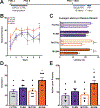Early resource scarcity alters motivation for natural rewards in a sex- and reinforcer-dependent manner
- PMID: 36301314
- PMCID: PMC9817039
- DOI: 10.1007/s00213-022-06264-9
Early resource scarcity alters motivation for natural rewards in a sex- and reinforcer-dependent manner
Abstract
Rationale: Early life adversity impacts reward-related behaviors, including reward seeking for drugs of abuse. However, the effects of early stress on natural rewards, such as food and social rewards, which have strong implications for symptoms of psychiatric conditions such as major depressive disorder (MDD), are understudied. To fill this gap, we used the limited bedding and nesting (LBN) procedure to assess the impact of early resource scarcity on motivational drive for both food and social rewards in rats.
Methods: Male and female Long Evans rats were reared in either an LBN environment, with limited nesting materials and no enrichment, from their postnatal day 2-9 or control environment with ample nesting materials and enrichment. As adults, they were tested for reward-seeking behavior on progressive ratio operant tasks: food reward (sucrose) or social reward (access to a same-sex/age conspecific).
Results: We observed sex differences in the impact of LBN on motivation for natural rewards. In males, LBN increased motivation for both a sucrose and social reward. In females, LBN reduced motivation for sucrose but had no effect on social reward.
Conclusions: These results suggest that the effects of LBN on motivation for natural rewards are both sex- and reinforcer-dependent, with males and females showing differential motivation for food and social rewards following early scarcity. Our previous data revealed an LBN-driven reduction in motivation for morphine in males and no effect in females, highlighting the reinforcer-dependent impact of early resource scarcity on motivated behavior more widely.
Keywords: Early life stress; Food reward; LBN; Natural reward; Sex difference; Social motivation.
© 2022. The Author(s), under exclusive licence to Springer-Verlag GmbH Germany, part of Springer Nature.
Conflict of interest statement
Figures


Similar articles
-
The consummatory and motivational behaviors for natural rewards following long-term withdrawal from morphine: no anhedonia but persistent maladaptive behaviors for high-value rewards.Psychopharmacology (Berl). 2017 Apr;234(8):1277-1292. doi: 10.1007/s00213-017-4565-1. Epub 2017 Feb 22. Psychopharmacology (Berl). 2017. PMID: 28229178
-
Early-life adversity facilitates acquisition of cocaine self-administration and induces persistent anhedonia.Neurobiol Stress. 2018 Jan 12;8:57-67. doi: 10.1016/j.ynstr.2018.01.002. eCollection 2018 Feb. Neurobiol Stress. 2018. PMID: 29888304 Free PMC article.
-
Modified limited bedding and nesting is a model of early-life stress that affects reproductive physiology and behavior in female and male Long-Evans rats.Physiol Behav. 2020 Oct 1;224:113037. doi: 10.1016/j.physbeh.2020.113037. Epub 2020 Jun 27. Physiol Behav. 2020. PMID: 32603746
-
Early life adversity promotes resilience to opioid addiction-related phenotypes in male rats and sex-specific transcriptional changes.Proc Natl Acad Sci U S A. 2021 Feb 23;118(8):e2020173118. doi: 10.1073/pnas.2020173118. Proc Natl Acad Sci U S A. 2021. PMID: 33593913 Free PMC article.
-
Social interaction as a unique form of reward - Insights from healthy ageing and frontotemporal dementia.Neurosci Biobehav Rev. 2025 May;172:106128. doi: 10.1016/j.neubiorev.2025.106128. Epub 2025 Mar 27. Neurosci Biobehav Rev. 2025. PMID: 40157435 Review.
Cited by
-
Postpartum scarcity-adversity inflicts sex-specific cerebellar adaptations and reward behaviors in adolescence.Pharmacol Biochem Behav. 2023 Oct;231:173620. doi: 10.1016/j.pbb.2023.173620. Epub 2023 Aug 23. Pharmacol Biochem Behav. 2023. PMID: 37625522 Free PMC article.
-
Acute stress persistently alters instrumental motivation without affecting appetitive Pavlovian conditioning, extinction, or contextual renewal.Neurobiol Learn Mem. 2023 Jul;202:107771. doi: 10.1016/j.nlm.2023.107771. Epub 2023 May 12. Neurobiol Learn Mem. 2023. PMID: 37182757 Free PMC article.
-
Sex differences in the social motivation of rats: Insights from social operant conditioning, behavioural economics, and video tracking.Biol Sex Differ. 2024 Jul 19;15(1):57. doi: 10.1186/s13293-024-00612-4. Biol Sex Differ. 2024. PMID: 39030614 Free PMC article.
-
The effects of different types of social interactions on the electrophysiology of neurons in the nucleus accumbens in rodents.Neurosci Biobehav Rev. 2024 Sep;164:105809. doi: 10.1016/j.neubiorev.2024.105809. Epub 2024 Jul 14. Neurosci Biobehav Rev. 2024. PMID: 39004323 Review.
-
Stress, associative learning, and decision-making.Neurobiol Learn Mem. 2023 Oct;204:107812. doi: 10.1016/j.nlm.2023.107812. Epub 2023 Aug 19. Neurobiol Learn Mem. 2023. PMID: 37598745 Free PMC article. Review.
References
-
- Agmo A (1997) Male rat sexual behavior. Brain Res Brain Res Protoc 1: 203–9. - PubMed
-
- Bari AA, Pierce RC (2005) D1-like and D2 dopamine receptor antagonists administered into the shell subregion of the rat nucleus accumbens decrease cocaine, but not food, reinforcement. Neuroscience 135: 959–68. - PubMed
-
- Baskin-Sommers AR, Foti D (2015) Abnormal reward functioning across substance use disorders and major depressive disorder: Considering reward as a transdiagnostic mechanism. International Journal of Psychophysiology 98: 227–239. - PubMed
MeSH terms
Substances
Grants and funding
LinkOut - more resources
Full Text Sources
Research Materials
Miscellaneous

